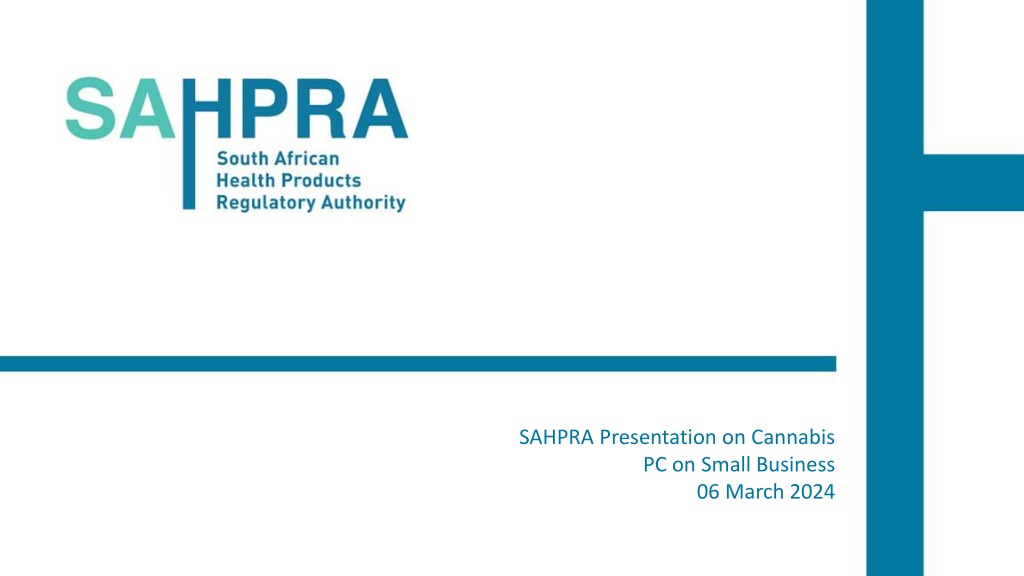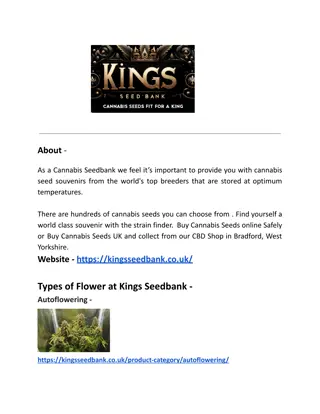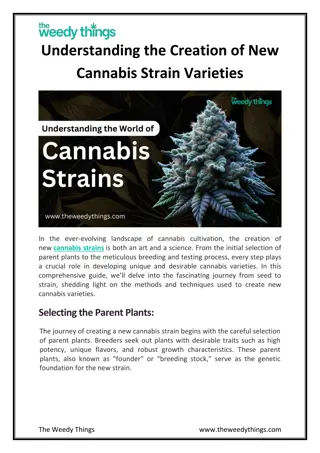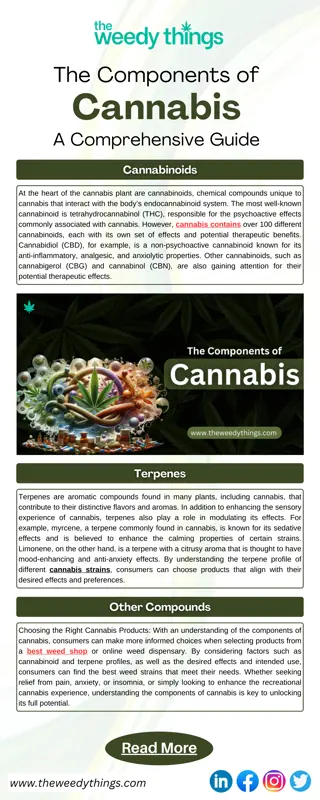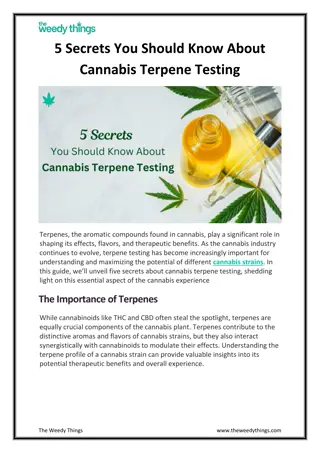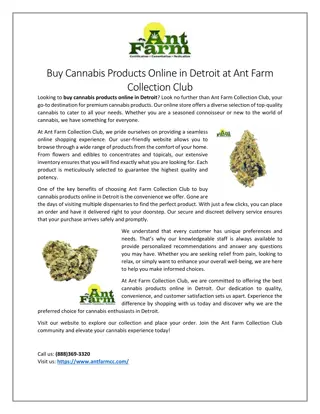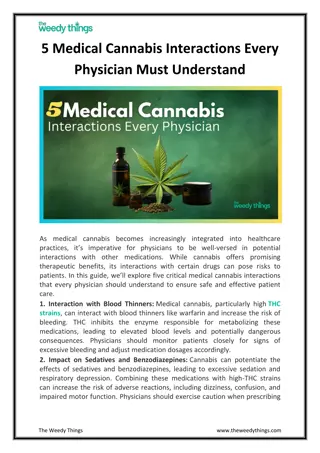National Cannabis Master Plan Framework for Economic Growth
South Africa initiated the National Cannabis Master Plan to industrialize and commercialize the cannabis industry, aiming to boost economic growth, create jobs, and alleviate poverty. The plan encompasses low-THC and high-THC cannabis, with objectives such as increasing product variety, supporting local farmers, promoting small businesses, and enhancing research and technology development. Regulatory systems, seed supply, producer support, market development, manufacturing, education, and communication are key focus areas in this strategic framework.
Download Presentation

Please find below an Image/Link to download the presentation.
The content on the website is provided AS IS for your information and personal use only. It may not be sold, licensed, or shared on other websites without obtaining consent from the author. Download presentation by click this link. If you encounter any issues during the download, it is possible that the publisher has removed the file from their server.
E N D
Presentation Transcript
SAHPRA Presentation on Cannabis PC on Small Business 06 March 2024
Cannabis and the Cannabis Master Plan Cabinet took a decision in July 2019 that South Africa needs a national strategy for industrialisation and commercialisation of Cannabis in order to increase economic growth, create jobs and poverty alleviation. The Minister of Agriculture, Land Reform and Rural Development was appointed as the convener of this process. The Inter-departmental Committee was established to guide the development of the National Cannabis Master Plan. This committee is composed of representatives from departments like Health, Justice, DALRRD, Small Business Development; Science and Innovation; DTIC; Presidency; and SAPS. Representatives of state owned entities like SAHPRA, ARC, CSIR, and some universities were also co-opted into the committee. The scope of the master plan includes both low-THC and High-THC Cannabis.
NATIONAL CANNABIS MASTER PLAN FRAMEWORK The Master Plan is aimed at providing a framework for the establishment, growth and development of the Cannabis industry in South Africa in order to contribute to economic growth, poverty alleviation and job creation OBJECTIVES Increase the volumes and variety of Cannabis products destined for both local and export markets. Establish and increase the capacity of South African farmers to produce dagga and hemp Create opportunities for creation of small and medium size enterprises across the Cannabis value chain. Replace imported Cannabis products with locally produced products. Increase investments in research and technology development to support increased production, productivity and competitiveness of the Cannabis industry. Establish and increase the manufacturing capacity of the South African Cannabis industry. Development and maintenance of an effective regulatory system by strengthening law enforcement measures to deter the production, manufacturing and sale of Cannabis outside the legal framework. 3. RESEARCH AND TECHNOLOGY DEVELOPMENT 7. 1. EFFECTIVE REGULATORY SYSTEMS 2. SUSTAINABLE SEED SUPPLY SYSTEMS 4. SUSTAINABLE PRODUCER SUPPORT SYSTEMS 6. SUPPLIER DELOPMENT SYSTEMS 5. MARKET DEVELOPMENT MANUFACTURING AND PRODUCT DEVELOPMENT 8. EDUCATION AND TRAINING 9. COMMUNICATION AND AWARENESS
Authorities regulating the Cannabis Plant DALRRD Low THC Cannabis for industrial purposes (less than 0.2% THC) SAHPRA (DOH) THC for medicinal purposes (including the cannabis plant material that exceeds the 0.2% THC Limit)
Current SAHPRA Regulation of Cannabis for Medicinal Purposes Section 22C(1)(b) requires that manufacturers of scheduled substances are required to be licensed by SAHPRA. THC and CBD and the cannabinoids implicated by the schedules require a licence to manufacture (includes cultivation). Inspections are conducted by SAHPRA according to GMP, which includes plants cultivated for medicinal purposes (hence inclusion of GACP See Annexure 7 of the PIC/S GMP guide) Section 22A(9) permits are required for possessing THC during the cultivation / manufacturing process Section 22A(11) permits are required for exporting THC containing product Licences are for export by default, unless demonstrated otherwise.
Current Scheduling of Cannabinoids Cannabidiol (CBD) is listed in Schedule 4, except: a) in complementary medicines containing no more than 600 mg cannabidiol per sales pack, providing a maximum daily dose of 20 mg of cannabidiol, and making a general health enhancement, health maintenance or relief of minor symptoms (low-risk) claim; or [S0] b) processed products made from cannabis raw plant material intended for ingestion containing 0,0075 percent or less of cannabidiol where only the naturally occurring quantity of cannabinoids found in the source material are contained in the product.
Current Scheduling of Cannabinoids (-)-transdelta-9-tetrahydrocannabinol (THC) is listed in Schedule 6, except a) A. in raw plant material and processed products manufactured from such material, intended for industrial purposes and not for human or animal ingestion, containing 0,2 % percent or less of tetrahydrocannabinol; b) processed products made from cannabis containing 0,001 percent or less of tetrahydrocannabinol; or c) when raw plant material is cultivated, possessed, and consumed by an adult, in private for personal consumption.
Cannabis Phakisa Action Lab SAHPRA participated in the Cannabis Phakisa Action Lab hosted by DALRRD and Operation Vulindlela, held 19 to 23 June 2023. Attendees: Government, social partners, traditional leaders, faithbased organisations, industry experts/scientists and legal experts 3 workstreams in the programme: Enabling legislative and regulatory reform Enabling innovation for investment Enabling inclusive business growth Important outcomes were actions identified by responsible departments and agreed Foundational Policy principles for Cannabis.
Actions identified for SAHPRA Schedule amendment to enable DALRRD to regulate cultivation of all Cannabis Enable the limit for THC to be determined by the Minister of Agriculture Enable SAHPRA to have oversight over cannabis cultivated for medicinal purposes only (including cultivation for the purposes of APIs) NB: Schedule amendment is subject to DOJ legislation overcoming cannabis in the Drugs and Drugs Trafficking Act schedule
Actions identified for SAHPRA Revision of licensing framework based on DALRRD development of Good Agricultural Practice standard Enable farmers to cultivate under GAP which is the minimum requirement for plants for medicinal purposes. Enable SAHPRA to licence activities of cutting, drying, extraction etc under GMP requirements (see annexure 7 of PIC/S GMP Guide)
Schedule 6 amendment of THC SAHPRA has proposed amendments to the Schedule 6 in the Medicines Act with respect to THC. Schedules are currently out for comment as per the Minister of Health, published 15 Jan 2024 for a 2-month comment period.
Schedule 6 amendment of THC comparison of changes Current Schedule Proposed schedule Amendments Comment Brackets deletion/omission Underlined - addition Tetrahydrocannabinol [(-)-transdelta-9- tetrahydrocannabinol)], except (-)-transdelta-9-tetrahydrocannabinol (THC), except Adjustment of name a. in raw cannabis plant material cultivated and possessed in accordance with a permit issued in terms of the Plant Improvement Act (Act 11 of 2018) and processed products manufactured from such material, intended for agricultural or industrial purposes, [and not for human or animal ingestion, containing 0,2 % percent or less of tetrahydrocannabinol;] including the manufacture of consumer items or products which have no pharmacological action or medicinal purpose, or a. in raw plant material and processed products manufactured from such material, intended for industrial purposes and not for human or animal ingestion, containing 0,2 % percent or less of tetrahydrocannabinol; Exemption from S6 applies to all cannabis plant material cultivated under Plant Improvement Act Exemption includes agricultural purposes Expansion on what industrial purposes means in line with Schedule 0 to 4 preamble
Schedule 6 amendment of THC comparison of changes Current Schedule Proposed schedule Amendments Comment Brackets deletion/omission Underlined - addition b. [processed products made from cannabis containing 0,001 percent or less of tetrahydrocannabinol; or] b. processed products made from cannabis containing 0,001 percent or less of tetrahydrocannabinol; or Deletion of limit for processed products - Allow other product regulators to impose regulations and limits e.g. foodstuffs, cosmetics, agricultural feeds Aligning description to point a. c. when raw cannabis plant material is cultivated, possessed and consumed by an adult, in private for personal consumption. c. when raw plant material is cultivated, possessed, and consumed by an adult, in private for personal consumption.
Schedule 6 amendment of THC Contingencies for amendment To ensure public health and safety and to ensure South Africa fulfils its obligations in terms of the 1961 Single Convention on Narcotic Drugs, SAHPRA advised that the proposed amendments to THC inscription in Schedules is subject to 7 contingencies. The contingencies were communicated to: Minister of Health DG of DALRRD DG of DOJCD
Schedule 6 amendment of THC Contingencies for amendment DALRRD must develop and implement Good Agricultural Cultivation Practice standards, applicable to all holders of a permit to cultivate cannabis The designation, in terms of the Plant Improvement Act of appropriate limits for raw cannabis plant material to be considered low-THC , and thus appropriate for industrial purposes. The designation in permits issued by DALRRD in terms of the Plant Improvement Act, of appropriate measures to prevent the diversion of raw cannabis plant material cultivated specifically for its THC content, and to designate how and to which channels such material would be distributed. This would include mention of the requirement to obtain a manufacturing license from SAHPRA for any facility engaging in the production of plant or processed material for medicinal purposes.
Schedule 6 amendment of THC Contingencies for amendment The development of reporting procedures to enable the DALRRD to report on the quantities of cannabis with THC content in excess of the limit set for low-THC cannabis cultivated in South Africa to the International Narcotics Control Board. Passage of the Cannabis for Private Purposes Bill, with a clear indication of how non-medicinal ( adult use ) cannabis with higher THC content than that provided for low-THC cannabis would be regulated. This step would also entail the subsequent removal of mention of cannabis in the Schedules to the Drugs and Drug Trafficking Act. Appropriate measures being taken by the National Department of Health, in terms of the Foodstuffs, Cosmetics and Disinfectants Act, to regulate cannabis-derived products intended for human ingestion or other human use, other than for medicinal purposes. Appropriate measures being taken by DALRRD, in terms of the Fertilizers, Farm Feeds, Agricultural Remedies and Stock Remedies Act, to regulate cannabis-derived products intended for animal ingestion or other animal use, other than for medicinal purposes.
Way forward After public and stakeholder comments on proposed schedule amendments, work towards finalization of amendments Engage with stakeholders identified in the contingencies to ensure implementation of items identified.
Support, Challenges and Successes SAHPRA implemented a licence application status letter for medical cannabis licence applicants SAHPRA provides leniency in terms of time for applicants to meet requirements Challenges in medicinal cannabis space: Diversion of product into the illicit market Applicants meeting requirements for medicinal cannabis Registration of medicines containing THC and CBD South African licence holders have and still are exporting bulk medicinal cannabis legally to importing countries
